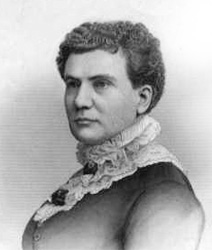
Pioneering Alumna Fought for Women's Rights
(Published in print: Concord Monitor: Tuesday, November 13, 2012)
Susan McLane ran for Congress against Charlie Bass and Judd Gregg in 1980 – and lost. Her daughter, Annie Kuster, ran against Bass this year and won.
But if you think McLane would be delighted at Kuster's win, consider how thrilled Marilla Ricker would be – not just with Kuster but also with the state's new, all-female congressional delegation. Ricker was a pioneering New Hampshire feminist who opposed a different Bass more than a century before Kuster. She was a leading voice for the rights of women to vote and hold public office. It was figures like her, after all, who made it possible for Kuster and other women to appear on the ballot – and to win on Election Day.
Ricker, who was born in New Durham and graduated from what was then Colby Academy in New London in 1861, was a young widow before she was 30. Her husband's death left her both money and independence – and she devoted much of the next 50 years to advocating for women's suffrage.
Ricker was the first woman in the state to try to vote. She argued that her willingness to pay her property taxes afforded her the right to vote as well. Hadn't the local officials ever heard about taxation without representation? They were unmoved.
That was just one of many of Ricker's arguments.
Just because the law didn't specifically say that women could vote didn't necessarily mean that they couldn't, she reasoned. “No woman was ever known to escape a criminal statute because its language ignored her sex. . . . Shall the word 'he' include woman in one set of laws and exclude her in another?” she wrote.
She argued that women deserved the same rights as blacks. She argued that without the vote, women would never have equal economic power. She argued that female voters would look out for issues of child mortality, care for the aged and issues of women in the workplace – issues she said “could not be satisfactorily settled if the woman's point of view is left out.”
Ricker gave speeches all over the state. She hounded lawmakers and newspaper editors year after year after year – but most were slow to come around. Here's how Edgar Aldrich of Littleton, later a federal judge, argued against women's suffrage at a constitutional convention in 1902: It would, he said, “disturb the serene security of motherhood.”
Ricker was a Republican but not a progressive one, despite the atmosphere of the times. So when Robert Bass of Peterborough, a leader in the progressive wing of the GOP, looked like a shoo-in for the gubernatorial nomination, Ricker decided to challenge him. This was 1910 – still a decade before women won the right to vote. Nonetheless, she reasoned, there were only two qualifications to run for governor listed in the state Constitution and she met them both. She had lived here more than seven years and was more than 30 years old – in fact, she was 70.
Ricker's campaign focused on two issues: property tax reform (she hoped to make churches start paying) and voting rights for women. She drew considerable attention to her cause, but the secretary of state refused to put her name on the ballot, arguing that she wasn't a voter and therefore couldn't be governor.
Nine years later, the state finally caught up to Ricker.
The Legislature met in special session in 1919 and ratified the 19th Amendment to the U.S. Constitution, granting women the right to vote. The very next year, women voted in force. Some even got elected to the Legislature.
The vote, Ricker said, “placed the state of New Hampshire on the right side of one of the great questions of the day.”
Ricker never got to hold elected office in New Hampshire – a chance she was denied because of her gender. After Tuesday's election, most of the highest-ranking elected officials in the state will be women. They owe Ricker a debt of gratitude.


